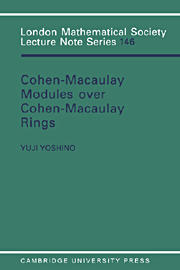Book contents
- Frontmatter
- Contents
- Preface
- Chapter 1 Preliminaries
- Chapter 2 AR sequences and irreducible morphisms
- Chapter 3 Isolated singularities
- Chapter 4 Auslander categories
- Chapter 5 AR quivers
- Chapter 6 The Brauer-Thrall theorem
- Chapter 7 Matrix factorizations
- Chapter 8 Simple singularities
- Chapter 9 One-dimensional CM rings of finite representation type
- Chapter 10 McKay graphs
- Chapter 11 Two-dimensional CM rings of finite representation type
- Chapter 12 Knörrer's periodicity
- Chapter 13 Grothendieck groups
- Chapter 14 CM modules on quadrics
- Chapter 15 Graded CM modules on graded CM rings
- Chapter 16 CM modules on toric singularities
- Chapter 17 Homogeneous CM rings of finite representation type
- Addenda
- References
- Index
- Index of Symbols
Chapter 9 - One-dimensional CM rings of finite representation type
Published online by Cambridge University Press: 20 January 2010
- Frontmatter
- Contents
- Preface
- Chapter 1 Preliminaries
- Chapter 2 AR sequences and irreducible morphisms
- Chapter 3 Isolated singularities
- Chapter 4 Auslander categories
- Chapter 5 AR quivers
- Chapter 6 The Brauer-Thrall theorem
- Chapter 7 Matrix factorizations
- Chapter 8 Simple singularities
- Chapter 9 One-dimensional CM rings of finite representation type
- Chapter 10 McKay graphs
- Chapter 11 Two-dimensional CM rings of finite representation type
- Chapter 12 Knörrer's periodicity
- Chapter 13 Grothendieck groups
- Chapter 14 CM modules on quadrics
- Chapter 15 Graded CM modules on graded CM rings
- Chapter 16 CM modules on toric singularities
- Chapter 17 Homogeneous CM rings of finite representation type
- Addenda
- References
- Index
- Index of Symbols
Summary
We have shown in the last chapter that Gorenstein rings of finite representation type are simple singularities. This chapter aims at showing that the converse is true for onedimensional local rings. More generally we are able to provide a necessary and sufficient condition for one dimensional local rings to be of finite representation type; see Theorem (9.2). Furthermore we can draw the AR quivers for simple singularities of dimension one.
Throughout the chapter (R, m, k) is a one-dimensional analytic local algebra over k, where k is an algebraically closed field of characteristic 0. Since we are interested in the finiteness of representation type, we always assume R has only an isolated singularity, or equivalently R is reduced; see (3.1) and (4.22). As before let ℭ(R) be the category of CM modules over R. Recall that the objects in ℭ(R) are exactly the modules without torsion, (1.5.2).
(9.1) DEFINITION. Let R* be the integral closure of R in its total quotient ring. Note that R* is also a one-dimensional (not necessarily local) ring which is finite over R. A local ring S is said to birationally dominateR if R ⊂ S ⊂ R*.
One of the aims of this chapter is to prove
(9.2) THEOREM. (Greuel-Knörrer) The following two conditions are equivalent:
(9.2.1) R is of finite representation type;
(9.2.2) R birationally dominates a simple curve singularity.
In particular we have:
(9.3) COROLLARY. A local ring of simple singularity of dimension one is of finite representation type.
- Type
- Chapter
- Information
- Maximal Cohen-Macaulay Modules over Cohen-Macaulay Rings , pp. 69 - 84Publisher: Cambridge University PressPrint publication year: 1990



